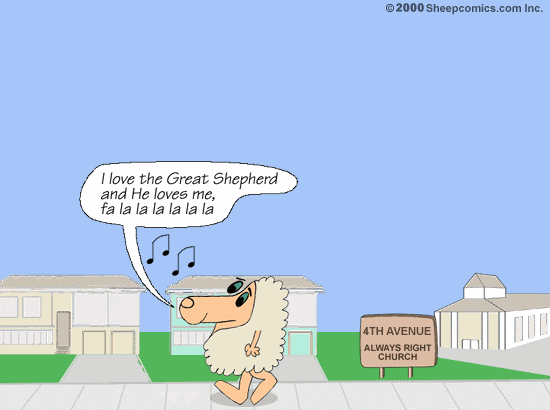
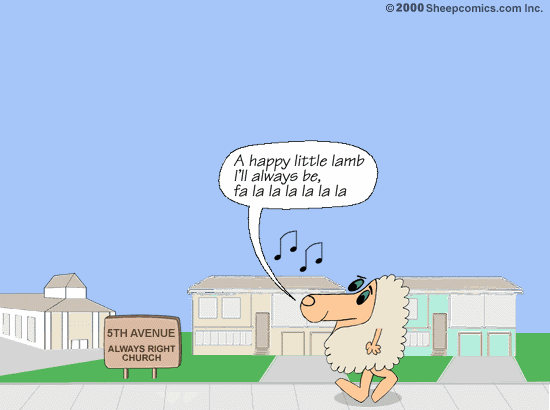
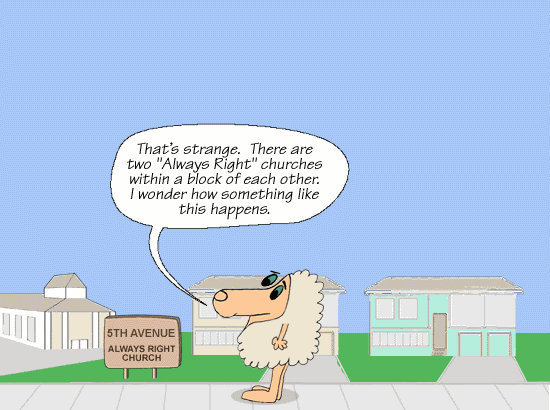
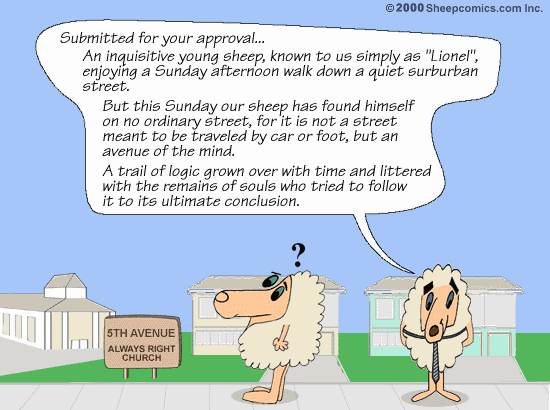
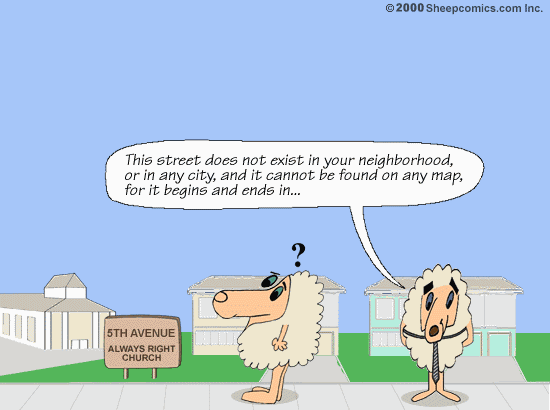

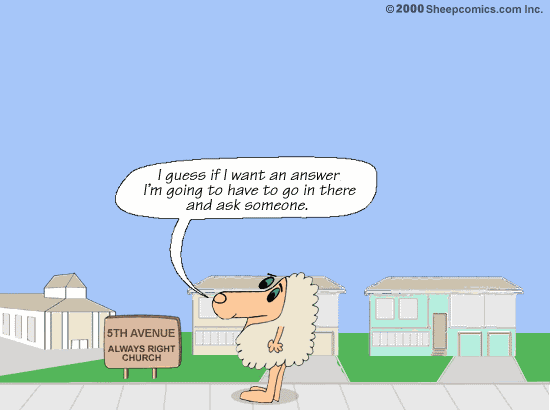
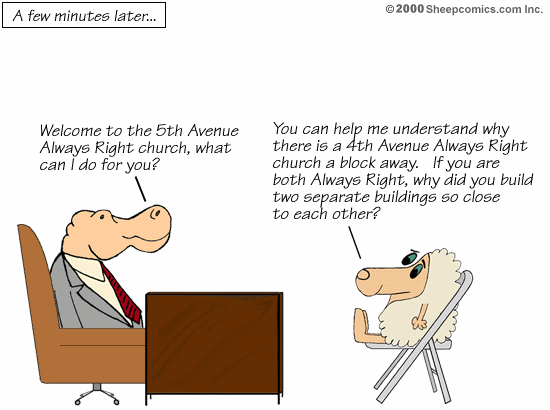
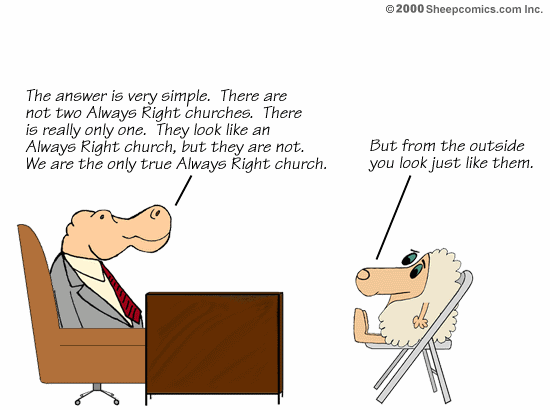

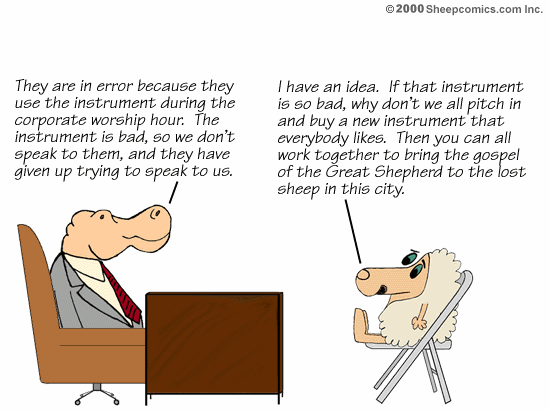
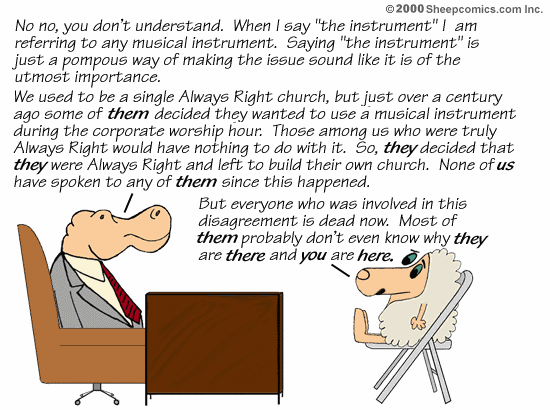
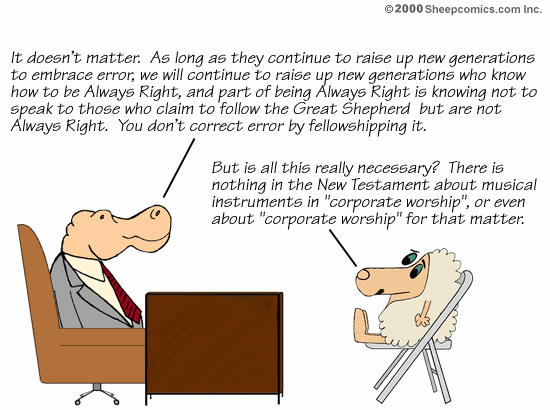
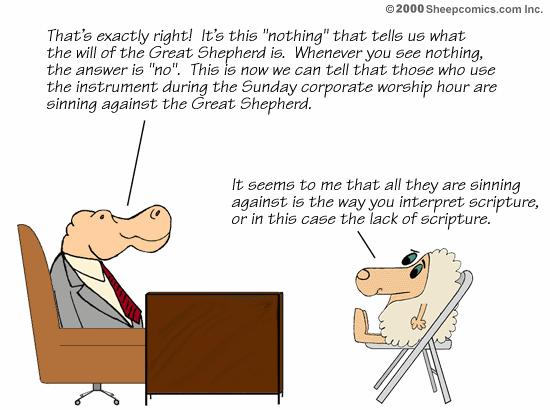
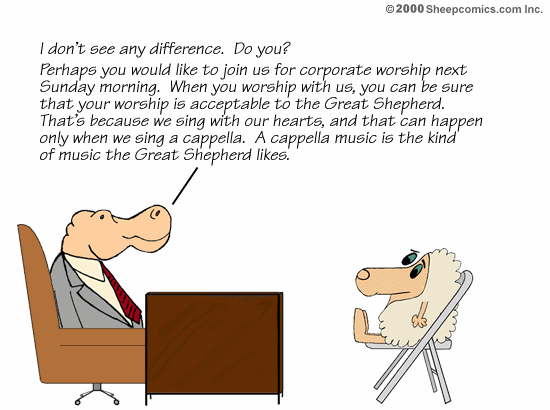
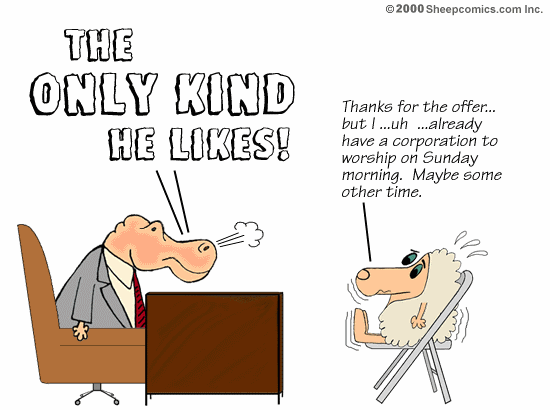
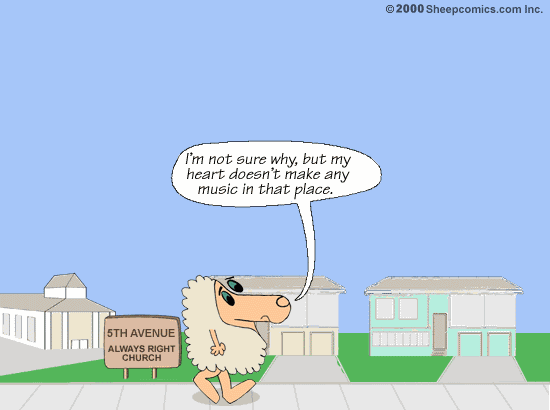
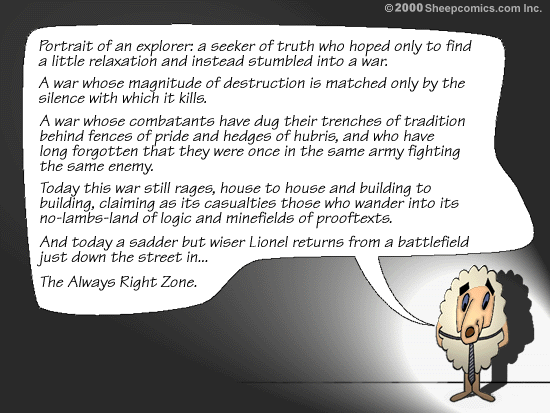
Editorial Notes
I completed the original version of this cartoon almost a year and a half ago. It was one of the first batch of Sheep Comics™ cartoons that I completed before launching the Sheep Comics™ web site back in March of 1999. Publishing this strip back then did not make sense to me because the character of Lionel the Average Lamb had not been developed. I wanted to wait until the strip had a certain "momentum", for lack of a better term, before publishing this cartoon. Also, I took advantage of a year of graphics experience and enhanced it significantly before publication.
This strip deals with a subject that has caused me sadness and exasperation for almost twenty years. It deals with division among the Body of Christ, and why people who should be talking to each other donít. This strip may make some of you angry. I may lose some viewers and some links to this site. But then, I didnít create the Sheep Comics in order to become popular.
What Would Chloeís People Do?
What would we do without Paulís first letter to Corinth? Who do we have to thank for it? Paul? The Holy Spirit? Both, but who else? Paul writes in 1 Corinthians 1:10 Ė 12:
I appeal to you, brothers, in the name of our Lord Jesus Christ, that all of you agree with one another so that there may be no divisions among you and that you may be perfectly united in mind and thought. My brothers, some from Chloe's household have informed me that there are quarrels among you. What I mean is this: One of you says, "I follow Paul"; another, "I follow Apollos"; another, "I follow Cephas "; still another, "I follow Christ." (NIV)
Who were these people at Chloeís household? We donít know, but they must have been concerned about the divisions and quarrels among the Christians in Corinth. Is Paulís first letter to Corinth a reply to a letter from Chloeís household? What would these members of Chloeís household think about some of the reasons Christians divide today?
Worship Wars
In Corinth, it seemed the divisions were fairly easy to understand. Paul says that they had to do with following different people, and Paul even names some names. Today, the divisions among Christians seem to arise from all sorts of places: theology, methodology, leadership structure, etc. I wonder how many self-professed Christians even know how their denomination (or their "non-denomination") is different from others and how it came into existence.
I suppose some division is inevitable. The world is a big place, and Christianity has permeated many different cultures. Besides, itís been almost 2000 years. Maybe itís asking a little too much for all of Christendom to be, as Paul said, "perfectly united in mind and thought."
Still, it seems that a lot of this division never needed to happen. What I mean by "division" is the phenomenon where two people believe all the same basic and essential doctrines but donít associate with each other. Some may make this decision for themselves during their lives, but others grow up in churches where the decision was made some time in the past, perhaps generations in the past.
Here is an example. Back in the 1980ís I was sent to a large city in the Midwest on a business assignment that was to last about six months. Once I got settled in my new apartment I went looking for a church. It wasnít because I thought I had to "worship" every Sunday, but rather because I didnít want spend six months with no Christian fellowship.
I was looking primarily for "restoration movement" churches at the time, and I found two of them close to home and within about two blocks of each other. They had different names, but both their lineage traced back to a common group of churches that existed in the 19th century. Each church had about 400 people, but they had no interaction with each other, even though their doctrine seemed practically identical. This seemed strange to me. Did something in the past happen to make them not want to associate with each other? Why was there not a single church with 800 people?
What happened? In this case, it probably had something to do with what goes on during the 90 minutes or so each Sunday morning when Christians assemble to worship. (Iíve studied the history, so this really is an "educated" guess.) Sometime in the past there was a "worship war" fought on a grand scale. When "worship worlds" collide, churches often divide.
What causes a "worship war" to happen? The answer is easy: different views of what "worship" is or what it should be. What are the differences? These are too numerous to list. However, in my experience I have found two different approaches to "worship" that seem to be continually at odds with each other. These two approaches are "conformance worship" and "performance worship".
Conformance Worship
What I call "conformance worship" is focused on conforming to the "law of worship" as revealed in the New Testament. This is also called the "Regulative Principle of Worship." This approach is based on the following assumptions.
There is a scriptural law of worship. Only God determines how He is to be worshipped.
Anything the church does in worship must be proven from the Bible.
Whatever is not commanded by God in the Bible is forbidden.
Once these assumptions are accepted, it is then necessary to search the New Testament to find the passages which authorize the various "acts" that are acceptable during worship. For example, Colossians 3:16 authorizes singing during worship because it says
"Let the word of Christ dwell in you richly as you teach and admonish one another with all wisdom, and as you sing psalms, hymns and spiritual songs with gratitude in your hearts to God." (NIV)
Any "act" performed "during worship" that cannot be found in the New Testament, either by scriptural command or example, is tantamount to offering unauthorized fire before the Lord, just like Nadab and Abihu did in Leviticus 10:1-2. And we know what happened to Nadab and Abihu: they were instantly consumed by fire from the presence of the Lord.
(If you want to see a paper detailing the "Regulative Principle of Worship", Click Here.)
(If you want to see the best paper I've ever read on worship, Click Here.)
Performance Worship
On the other extreme is what I call "performance worship". Worship is a performance I attend which is supposed to get me "pumped up for Jesus", or something like that. Worship is the responsibility of a "worship team" composed of the top musical talent in the church. Coordinating and choreographing all this talent is the job of the "worship leader", often a full-time church staff member.
In "performance worship", it isnít so important that the "acts" of worship are scripturally authorized. What is important is that the "acts" of worship work together like acts in a play or movements in a concert. Each performance builds toward the next one, and the climax is when the dynamic preacher delivers his inspiring speech for the week .
Like any play or concert, "performance worship" is something that must be continually managed and improved. Like any play or concert, much time may be spent planning, practicing and rehearsing. And like any play or concert, it demands no more of me than to sit back and enjoy the show. Thatís entertainment! Where are these "worship leaders" and performances in the New Testament? Nowhere.
Does the New Testament tell us what to do During Worship?
Itís amazing what you can learn about "worship" if you forget youíve ever been to church. Letís let the New Testament tell us what worship is. Iím not going to add the complexity of going into the Greek. (There are actually four different Greek words that get translated into the English word "worship", and none of these words means "meeting" or "assembly".) For now, I just want to keep this simple and make a point.
If I wanted to see what the New Testament says about "worship", what I would do is find all the occurrences of the word "worship" and see what is written. I did this and here are the results. I used the New International Version of the Bible.
First, the word "worship". It occurs 47 times in 44 verses. Only one of these passages mentions "worship" in the context of an assembly of Christians. This is 1 Cor 14:24-25 which says
"But if an unbeliever or someone who does not understand comes in while everybody is prophesying, he will be convinced by all that he is a sinner and will be judged by all, and the secrets of his heart will be laid bare. So he will fall down and worship God, exclaiming, "God is really among you!" (NIV)
In this passage, the unbeliever falls down and worships God. The particular Greek word behind "worship" here means to "fall prostrate". This doesnít tell me much about what Christian worship is, however.
Second, I tried the word "worshipping". There were 2 occurrences in 2 different passages. One has to do with Christian worship, and that is Acts 13:2 which says
While they were worshipping the Lord and fasting, the Holy Spirit said, "Set apart for me Barnabas and Saul for the work to which I have called them." (NIV)
Well, I know that there were Christians in Antioch who were "worshipping", but I still donít know what they did "during worship."
Third, I tried "worshiper". There were 3 occurrences, but nothing telling me about Christian assemblies.
Finally, I tried the word "worshipped". This time I have 21 occurrences in 20 verses. Any clues to what Christians did "during worship"? No, but I found out in Luke 24:52 that those who saw Jesus ascend "worshipped" him afterwards. In this case, itís the "fall prostrate" kind of "worship" again.
A Few Non-Conforming Conclusions about "Conformance Worship"
I looked up all the occurrences of every variant of the word "worship" and I found that none of them occur in the context of rules concerning Christian assemblies.
Furthermore, in all the passages Iíve seen used to authorize certain "acts of worship", I have never seen the actual word "worship" or any variant of it.
Clearly there is something wrong with this picture. Here are my conclusions.
First, if there was a certain meeting that had to be performed a certain way every week, a "law of worship", this would have been revealed to us clearly and explicitly. God is perfectly capable of writing law and instructions for keeping it (see the Law of Moses). God is not a God of confusion. There would be no need to piece together a "law of acts of worship" by taking scriptures out of context from many different books in the New Testament; scriptures that donít even contain the word "worship."
Second, if "worship" was a certain special kind of Christian meeting, we would expect to find the word "worship" used in the New Testament to describe Christian meetings. The truth is that we donít find that anywhere.
Third, this whole approach to "worship" seems like it was an exercise in reverse-engineering. Itís like someone started with the assumption that "worship" is a special meeting every Sunday morning, and then picked through the New Testament trying to find out what to do during that meeting. The tradition came first, and the scriptures were retro-fitted in to make it work.
Fourth, the whole concept of "worship service" is not in the New Testament. It is an invention of man that has been handed down through the generations. Is it wrong? No. But lets be real about where it comes form.
A Third Choice: Transformance Worship
Is "worship" defined anywhere in the New Testament? When Jesus met the woman at the well in John 4, He told her about the kind of worshippers God wants.
"Yet a time is coming and has now come when the true worshipers will worship the Father in spirit and truth, for they are the kind of worshipers the Father seeks. God is spirit, and his worshipers must worship in spirit and in truth." (John 4:24-25 NIV)
The woman at the well wanted to know where to worship, but Jesus didnít tell her about a place to worship; he told her about "spirit" and "truth". God is "spirit", and "spirit" is not localized to a place and time. Can worship "in spirit" be confined to a building on Sunday morning, or any other time?
Also, worship must be "in truth". It must be according to the truths revealed by God. God did not reveal worship to be a certain kind of special meeting divided into a series of "authorized acts". God did not reveal "worship service" to us. God did not reveal worship to be a choreographed stage show that we sit through each week.
What has been revealed to us about worship? In Romans 12:1-2 Paul says.
"Therefore, I urge you, brothers, in view of God's mercy, to offer your bodies as living sacrifices, holy and pleasing to God--this is your spiritual act of worship. Do not conform any longer to the pattern of this world, but be transformed by the renewing of your mind. Then you will be able to test and approve what God's will is--his good, pleasing and perfect will." (NIV)
According to Paul, there is really only one act of worship: our bodies offered to God as living sacrifices. We are not to conform to the pattern of this world, but to be transformed.
Where does this leave all the arguing and rule-making about what is appropriate "during worship"?
So What Did I Do?
Which church did I choose while I was in that large Midwest city during my business assignment? The first church I visited was a "conformance worship" church. I remember being amazed at the immature and out-of-control behavior I saw at the "college and young professionals" class (or whatever it was called). I also remember a lot of smirk-faced robots stiffly shaking my hand, but no one seemed to care about me as a person. Even the hand shakes seemed like they were out of obligation; some sort of formality. It was a cold place.
The other church was definitely a "performance worship" church. I first attended an evening service. At the end there was a time to recognize visitors. I stood up, and the man behind the pulpit ordered everyone there to greet me. I felt welcomed and like I was part of their fellowship almost immediately.
I stayed at this church for the remainder of my time in this city. I sat through a lot of talent-show performances in the name of worship, but I also saw people who cared about each other, and about complete strangers too.